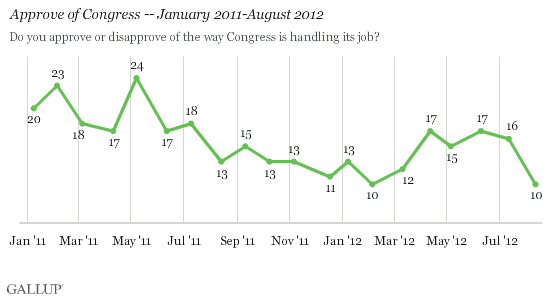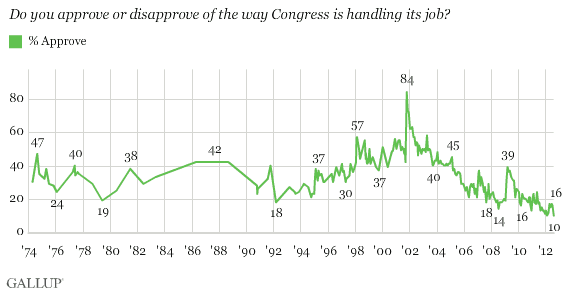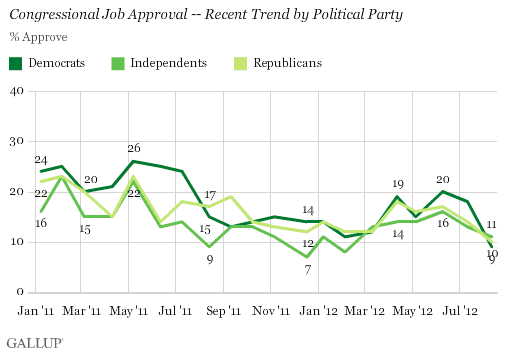PRINCETON, NJ -- Ten percent of Americans in August approve of the job Congress is doing, tying last February's reading as the lowest in Gallup's 38-year history of this measure. Eighty-three percent disapprove of the way Congress is doing its job.

Congress approval was 30% in Gallup's first measure using this question wording in April 1974, and has averaged 34% across the more than 230 times it has been measured since. Congress approval has been below 40% since early 2005, and below 20% every month since June 2011 -- dropping to 10% in February of this year and again now.

Before 2007, Congress approval had been below 20% only twice -- in 1979 and 1992. The highest congressional job approval in Gallup's history was 84% in October 2001, a month after the Sept. 11 terrorist attacks on New York City and Washington, D.C.
Congressional approval is down among all political groups and is now virtually the same across these groups -- with Democrats at 9%, independents at 11%, and Republicans at 10%. Democrats' approval declined the most, from 18% in July.

Bottom Line
Although Americans have generally been more negative than positive in their assessments of Congress over the past four decades, opinions have been especially negative in recent years -- and approval has again in August fallen to the record-low reading of 10%, last measured in February. Americans' views of Congress are so bad that it has now been more than a year since Gallup's monthly assessment was as high as 20%.
It is difficult to pinpoint precise causes for these extraordinarily negative views, although the continuing poor economy is certainly a major factor. The fact that control of Congress is now divided, with a Republican majority in the House and a Democratic majority in the Senate, may provide an opportunity for Americans of all political persuasions to dislike some aspect of Congress. With Congress divided, however, it is difficult to assess what impact its low ratings will have on the November elections, now less than three months away.
Presumptive Republican nominee Mitt Romney's choice for his vice presidential running mate, Paul Ryan, is himself a sitting member of the House, but it is not clear whether voters' disdain for Congress will in any way rub off on their assessments of Ryan. Both President Barack Obama and Vice President Joe Biden were members of the Senate, leaving Romney as the only one of the four presidential candidates who has not served as an elected representative in Washington.
Survey Methods
Results for this Gallup poll are based on telephone interviews conducted Aug. 9-12, 2012, with a random sample of 1,012 adults, aged 18 and older, living in all 50 U.S. states and the District of Columbia.
For results based on the total sample of national adults, one can say with 95% confidence that the maximum margin of sampling error is ±4 percentage points.
Interviews are conducted with respondents on landline telephones and cellular phones, with interviews conducted in Spanish for respondents who are primarily Spanish-speaking. Each sample includes a minimum quota of 400 cell phone respondents and 600 landline respondents per 1,000 national adults, with additional minimum quotas among landline respondents by region. Landline telephone numbers are chosen at random among listed telephone numbers. Cell phone numbers are selected using random-digit-dial methods. Landline respondents are chosen at random within each household on the basis of which member had the most recent birthday.
Samples are weighted by gender, age, race, Hispanic ethnicity, education, region, adults in the household, and phone status (cell phone only/landline only/both, cell phone mostly, and having an unlisted landline number). Demographic weighting targets are based on the March 2011 Current Population Survey figures for the aged 18 and older non-institutionalized population living in U.S. telephone households. All reported margins of sampling error include the computed design effects for weighting and sample design.
In addition to sampling error, question wording and practical difficulties in conducting surveys can introduce error or bias into the findings of public opinion polls.
View methodology, full question results, and trend data.
For more details on Gallup's polling methodology, visit www.gallup.com.
